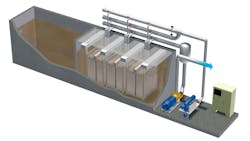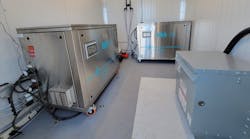The food manufacturing industry plays a pivotal role in ensuring a steady supply of safe and nutritious food to the global population. However, this essential sector needs large quantities of water in its various processes, which leads forward-thinking food manufacturers to address environmental concerns and resource depletion by implementing sustainable solutions for water reclamation and reuse.
The water challenge in food manufacturing
Water is an integral component of food manufacturing processes, used for everything from cleaning and sanitizing equipment to cooking, cooling, and packaging. As a result, the food industry is one of the largest consumers of water worldwide. According to the World Resources Institute, food and beverage production account for approximately 70% of global freshwater withdrawals. This significant water demand, combined with the potential for water pollution from agricultural runoff and industrial processes, underscores the urgent need for sustainable water management practices.
The benefits of water reuse
Conserving a precious resource
Water reuse in food manufacturing contributes to the conservation of freshwater resources. By recycling and treating water within the production facility, manufacturers can reduce their reliance on freshwater sources, thereby alleviating the strain on local ecosystems and ensuring a more sustainable water supply for future generations.
Cost savings
Implementing water reuse practices can lead to substantial cost savings for food manufacturers. By reducing the need to purchase and treat large quantities of fresh water, companies can lower their operational expenses.
Environmental stewardship
Water reuse aligns with the principles of environmental sustainability. By minimizing water consumption and pollution, food manufacturers can reduce their environmental footprint and contribute to the protection of aquatic ecosystems. This not only benefits the planet but also enhances a company's reputation as a responsible corporate citizen.
Bush Brothers Company — a food manufacturer focused on sustainability
Bush Brothers & Company (Bush) is a family-owned corporation that is best known for Bush’s Best brand of canned baked beans. They have been manufacturing their products since 1908. They focus on being good environmental stewards at the same time of providing their customers high quality food products. They use infinitely recyclable steel cans, have upgraded their water reuse facility and work everyday to reduce their natural gas use.
In 2014, after nearly a decade of operation, Bush began the process of upgrading their existing wastewater treatment system at their facility in Dandridge, Tennessee to ensure they maximized their water reclamation and reuse.
The original system was stressed to meet current demand and droughts had begun to limit well water supply to the facility, which highlighted the need for additional water sources. Bush wanted to improve their infrastructure to meet the actual and future requirements and improve sustainability with water reuse.
Solution
Bush’s improved and expanded their Process Water Reclamation Facility (PWRF), which includes:
- Screening
- Equalization
- Anaerobic contact process with DAF separation
- Biological nutrient removal (BNR) process using Membrane Bioreactor (MBR) technology including biological phosphorus removal, denitrification, and nitrification
- A portion of the MBR permeate goes to a Reverse Osmosis (RO) system for reuse as plant cooling tower makeup and boiler makeup
- The balance flows by gravity to an effluent holding pond prior to land application.
One of the key components of their PWRF is the ZeeWeed* MBR system, provided by Veolia Water Technologies & Solutions. The Veolia representatives worked consultatively with Bush to design and upgrade their water reclamation systems.
Results
The ZeeWeed MBR enabled reuse of 1,700 m3/day (300,000 gpd) of treated effluent water, which decreased the plants utility water intake by 30% and helped mitigate the risk of water shortage.
Membrane bioreactor (MBR) technology combines biological, secondary, and tertiary wastewater treatment in one step and has been used to treat wastewater to high effluent quality standards for more than 30 years. The MBR process guarantees a solids-free effluent, optimizes biological treatment systems for nutrient removal, and produces permeate that’s disinfected to levels safe for recreational use.
At its core, ZeeWeed MBR uses Veolia’s leading membrane technology while incorporating significant innovations that take wastewater treatment to the next level. Key advantages of the ZeeWeed MBR include:
- Process intensification — footprint savings and retrofit capabilities.
- Low total cost of ownership.
- Consistently produces high quality effluent.
- Reuse ready.
- Enabler of micropollutant removal.
The ZeeWeed MBR technology is a critical part of the solution for meeting both the water reuse and stringent discharge quality needs. The MBR allows downstream RO membrane processes, used for the final water treatment step, to operate very efficiently and with minimal maintenance. Because it combines several process steps (solids/liquid separation and post-filtration) and operates at higher mixed liquor concentrations, the ZeeWeed MBR also offers significant reductions in footprint and operational complexity.
The water reuse project implemented at Bush represents multiple sustainability benefits, including reduced environmental BOD and nutrient emissions, production of biogas fuel and cattle feed, and providing irrigation of cover crops. The high-quality effluent of the MBR also makes it suitable for several utility reuse applications like, cooling tower makeup and boiler makeup.
As a result of this work, Bush was the recipient of the Water Environment Federation (WEF) 2022 Industrial Water Quality Achievement Award, which recognizes innovative design and operation of an industrial wastewater, pre-treatment, or source prevention program.
Bush’s PWRF is a great example of industrial wastewater treatment and an appealing story that demonstrates an upgrade to increased demand and a highly sustainable approach targeting beneficial water reuse applications. It serves as an example for other industrial facilities seeking to maximize reuse and minimize environmental footprint.
Conclusion
Water reuse is a vital component of the food manufacturing industry's journey toward sustainability. As the demand for food continues to rise, so too does the need for responsible water management practices. By embracing innovative approaches, food manufacturers can reduce their environmental impact, conserve freshwater resources, and contribute to a more sustainable future. Water reuse is not only an ethical choice but also a strategic one, offering cost savings and improved brand reputation. As the industry continues to evolve, water reuse will remain a cornerstone of responsible food production.
Brian Arntsen has BS in Agricultural Engineering from the Catholic University in Argentina, and a postgraduate degree in Business Management at the I.A..E. He's the Global Domain Sales Leader at Veolia Water Technologies & Solutions, and has published more than 30 papers and articles during his 38-year career.
*Trademark of Veolia; may be used in one or more countries


